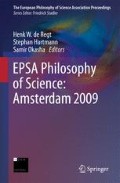Abstract
Responding to Laudan’s skeptical reading of history, an influential group of realists claim that the seriously wrong claims that past successful theories licensed were not properly implicated in the predictions that once singled them out as successful. For example, in the case of Fresnel’s theory of light, it is said that although he appealed to the ether he didn’t actually need to in order to derive his famous experimental predictions—as far as the latter were concerned the ether concept was “idle,” “dispensable” or worse. This view, developed by Philip Kitcher in the 1980s and subsequently supplemented by Jarrett Leplin and by Stathis Psillos, has received critical attention over the last decade, but more needs to be said on the subject—or so I suggest in this paper. I bring forward four converging argumentative lines to show how and why, from the days of Fresnel to at least two decades after the Michelson-Morley experiments, the ether functioned and was understood as an “indispensable” posit in physics. My first line draws from Fresnel’s actual deployment of the ether concept and the way he and his circle understood his theory’s achievements. The second line draws from the rise of surprising implication as an epistemological value and its impact on leading theorists in the last two-thirds of the century. The third line draws from discussions of the optical ether in end-of-century reports around 1900. The fourth focuses on entrenched metaphysical assumptions that persisted in the practice of physics until the advent of Special Relativity. Pulling these four lines together shows why attempts at synchronic identification of sound theory-parts (as advocated by Kitcher, Leplin and Psillos) are bound to fail, but also how realists might try to meet the challenge this creates.
Access this chapter
Tax calculation will be finalised at checkout
Purchases are for personal use only
References
Carrier, M. 2004. Experimental success and the revelation of reality: The miracle argument for scientific realism. In Knowledge and the world, eds. M. Carrier et al., 137–162. New York: Springer.
Carrier, M. 2007. A metaphysics for realism: Knowing the unobservable. Cambridge: Cambridge University Press.
Chakravartty, Anjan. 2003. The structuralist conception of objects. Philosophy of Science 70: 867–878.
Chakravartty, Anjan. 2007. A metaphysics for realism: Knowing the unobservable. Cambridge: Cambridge University Press.
Chang, Hasok. 2003. Preservative realism and its discontents: Revisiting caloric. Philosophy of Science 70: 902–912.
Cordero, A. 2011. Darwin’s theory and prediction. In Evolutionism and religion, ed. f. Minazzi, 79–94. Milano: Mimesis Edizioni.
Galison, P. 2004. Einstein’s clocks, Poincare’s maps: Empires of time. New York: W.W. Norton & Co.
Kitcher, Philip. 1993. The advancement of science. Oxford: Oxford University Press.
Kitcher, Philip. 2001. Science, truth, and democracy. New York: Oxford University Press.
Leplin, Jarrett. 1997. A novel defense of scientific realism. New York: Oxford University Press.
Lyons, Timothy D. 2006. Scientific realism and the Stratagema de Divide et Impera. British Journal for the Philosophy of Science 57: 537–560.
Psillos, Stathis. 1999. Scientific realism: How science tracks truth. New York: Routledge.
Stevenson, Loyd S. Jr. 1972. The aetherial ether. Austin, TX: University of Texas Press.
Whewell, William. 1847/1967. Philosophy of the inductive sciences, Part II, 2nd edn. London: Cass.
Whittaker, E.T. 1953/2007. A history of the theories of aether and electricity: From the age of Descartes to the close of the nineteenth century (1910). New York: Longmans, Green and Co.
Author information
Authors and Affiliations
Corresponding author
Editor information
Editors and Affiliations
Rights and permissions
Copyright information
© 2012 Springer Science+Business Media B.V.
About this paper
Cite this paper
Cordero, A. (2012). Rejected Posits, Realism, and the History of Science. In: de Regt, H., Hartmann, S., Okasha, S. (eds) EPSA Philosophy of Science: Amsterdam 2009. The European Philosophy of Science Association Proceedings, vol 1. Springer, Dordrecht. https://doi.org/10.1007/978-94-007-2404-4_3
Download citation
DOI: https://doi.org/10.1007/978-94-007-2404-4_3
Published:
Publisher Name: Springer, Dordrecht
Print ISBN: 978-94-007-2403-7
Online ISBN: 978-94-007-2404-4
eBook Packages: Humanities, Social Sciences and LawPhilosophy and Religion (R0)

